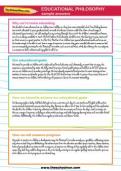Home educating a child with special educational needs

According to recent research, mainstream schools are failing to meet the requirements of pupils with special educational needs (SEN). Indeed, unhappiness at school is the reason why many parents decide to home educate their children.
An online survey of parents home educating children with SEN, by home education consultancy Ed Yourself, found that almost half said their child had become too anxious to attend school, and more than a third said their child had been bullied.


Free home education planning pack & resources
- Guidance, templates and advice to get you started
- Practical tips from experts and parents
- How to establish a routine and set learning goals
Parents also reported being under pressure to send children to school because of the effect on absence figures.
‘Parents sometimes feel they have no choice except to home educate when a school placement breaks down,’ says Fiona Nicholson, the founder of Ed Yourself. ‘But if the child is withdrawn from school by their parents, there will not generally be any support from the council because parents will be deemed to have opted out.’
What the law says
In England and Wales, parents have the right to educate their child at home – including if a child has additional needs, a statement of SEN or an Education, Health and Care (EHC) Plan.
If your child is at a mainstream school, you’ll need to write to the headteacher if you want to deregister them, explaining you are withdrawing your child from school and are educating them at home. It’s the responsibility of the school to let the local authority know.
If your child attends a special school, you need consent from the local authority to educate them at home. But it is illegal for a local authority to refuse unless they are genuinely concerned about a vulnerable child (for example, if they think there’s a risk of abuse or neglect).
The process for deregistering your child is the same: write to the headteacher. The school will then inform the local authority, which – in the vast majority of cases – will give permission.
In Scotland, you need consent from the local authority to withdraw a child from any school, whether it’s a mainstream or special school.
In Northern Ireland you may need permission if your child is registered at a special school.
How does home education affect your child’s statement or EHC plan?
The authority has a duty to review your child’s statement or EHC Plan annually. You don’t have to attend the review, but you can if you want to.
If your child has an EHC Plan and a personal budget, they’ll still be eligible for this. All children with EHC Plans can request a personal budget, and as long as home education is specified on your child's EHC Plan for educational provision, the council can provide this funding to ensure the best outcome for them.
Personal budgets can be paid in four ways:
- Direct payments, where you receive the cash to contract, purchase and manage services themselves.
- An arrangement whereby the local authority, school or college holds the funds and commissions the support specified in the plan (these are sometimes called notional budgets).
- Third party arrangements, where payments are made to and managed by an individual or organisation on behalf of you or your child.
- A combination of the above.
The council will check how your personal budget is being spent. They must monitor the use of direct payments at least once in the first three months, and when reviewing the EHC plan. The payments must be being used effectively and the amount must be appropriate.
How do I tailor home education to my child’s special educational needs?
If your child has a statement or EHC Plan and you’ve had a look at it, it will give you an idea of your child’s requirements. A statement isn’t a legally enforceable document (it only applies to schools), but it will give you a starting point for focusing your child’s learning. As a parent, you can also ask your local authority to carry out a reassessment of your child’s special educational needs.
There are also lots of charities and organisations supporting families of children with SEN, and they may be able to help with learning ideas that fit your child’s needs. The British Dyslexia Association, for example, offers resources to help with homework and handwriting.
Remember that not all learning needs to be academic. For instance, you could work on your child’s fine motor skills with activities like threading, beading, weaving and Lego, and go swimming, cycling or trampolining to help with balance and coordination.
Pros and cons of home educating a child with SEN
One disadvantage of home educating your child with SEN is that the support you get from the local authority may be lacking. ‘Where the child does have a statement or EHC Plan, parents are often unhappy with the treatment they receive from the local council’s special needs service,’ says Fiona Nicholson. ‘But on the positive side, they report that children's mental health tends to improve greatly once they are home educated.’
There are also some other pros and cons to weigh up before making the decision to home educate.
Pros
- One-to-one attention. You know your child better than anyone else and will have time to ensure their education is tailored to their needs and pace.
- Less pressure. The more informal setting of home can help children relax and enjoy learning. Without pressure, reading and writing may come more naturally.
- Enjoyment. When a child takes control of their learning they’re more likely to enjoy education and by following their own interests they will learn more quickly.
- Less risk of bullying. Being in a quiet environment with the choice of when to socialise and with whom may be a great benefit, depending on the particular needs of your child.
- Confidence and self-esteem. A positive learning experience can only help a child feel better about themselves.
Cons
- Lack of specialist knowledge. Parents may feel they have no alternative to home education, but feel out of their depth.
- Loss of income. You may have to give up paid work to home educate.
- Potential isolation. In some areas, you might feel rather alone unless you seek out support from online groups, national organisations or local meet-ups.
- Lack of professional support. Unlike in schools, where a special educational needs coordinator (SENCO) can help you navigate the system, you’re likely to be on your own.
What support can you get?
Home educators assume financial responsibility for their child, and the local authority may not continue providing services that your child previously received through school, such as occupational therapy, physiotherapy or speech and language therapy (SaLT). Funding is at the discretion of the local authority but in practice, it is rarely available.
There may be other ways of you accessing this support. Your GP may be able to arrange the therapies your child needs on the NHS. Some charities also offer support or financial assistance to help you meet your child’s needs.
There are also specialist legal advocates who may be able to help you challenge the local authority’s decision not to provide financial support or services, such as Education Advocacy.
However, it’s important to be prepared to finance your own services and weigh up whether you can take on the financial burden before you withdraw your child from school.
Useful resources for SEN home education
- Nasen (an organisation supporting all those who work with children with SEN)
- The National Autistic Society
- British Dyslexia Association
- The Dyspraxia Foundation: www.dyspraxiafoundation.org.uk
- HE Special (for families home educating children with SEN)
- ChatterPack resources for ADHD (and a wonderfully comprehensive list of free Speech and language, OT and SEND resources for families)

Give your child a headstart
- FREE articles & expert information
- FREE resources & activities
- FREE homework help






